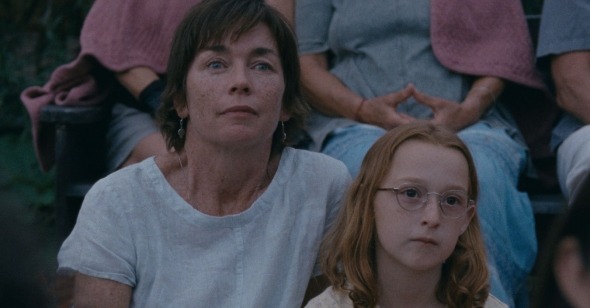Small World
By Shonni Enelow
Janet Planet
Dir. Annie Baker, U.S., A24
Early on in Janet Planet, Annie Baker’s sad and well-observed portrait of a mother and child, set in Western Massachusetts during the summer of 1991, Lacey (Zoe Ziegler), the blunt and friendless almost sixth grader whose perspective we follow through the film, pulls a string to open the curtain on a shoebox theater in her room, where a motley collection of porcelain and wooden dolls appear in a row. One expects theater in some form from the celebrated playwright Annie Baker, whose first film we are watching. Nevertheless, I was surprised by the restraint of that doll theater, which Baker returns to a few times during the film, but in which the dolls never move, never act, never act out. New dolls appear along with the characters who come in and out of the life of Lacey’s mother, Janet (Julianne Nicholson), whose acupuncture business gives the film its title, but the most we see Lacey interact with them is when she gently adjusts their paper blankets as they sleep. Still, we know their significance.
Lacey is our observer, but we sense that she doesn’t really want to be: she tries to penetrate her mother’s sadness, but remains outside the adult world of her lovers and friends, pains and longings. The film opens with one such attempt by Lacey, one that results in confusion and ambivalence: Lacey, at summer camp, sneaks out of a cabin at night, finds a payphone, and threatens, not without deadpan humor, to kill herself if her mother doesn’t pick her up––but in the next scene she regrets her act of desperation, finding her mother ensconced with her silent and possibly violent boyfriend (and it turns out that contrary to what she thought, her bunkmates like her and don’t want her to go). Later, she tells a friend of Janet’s that the reason she doesn’t have any friends of her own is “a complete mystery to me,” and Baker (who has said that she “wanted Lacey to remain a mystery”) lets it stay one to her audience as well, drawing us to her characters but also keeping us at a distance.
That distance is maintained not only with the title cards that announce the lovers and friends who come in and out of Janet and Lacey’s life but also with her actors’ quiet and oblique performances, which neither illustrate nor explain. We look for a long time, with Lacey, at Janet’s face: her blankness in the face of her boyfriend’s anger at her daughter, her features becoming taut as her friend insults her, truth-telling; preening, a little bit, for the men who surround her; finally, alone, towards the end of the film, listening to a poem. But Nicholson also keeps Janet at a remove, even when her eyes brim with tears; she’s always a bit away, even when she gets high and talks about herself, her bad decisions, her parents (her “Holocaust-survivor father” and “angry mother”). Those dolls in Lacey’s shoebox, lying on their sides, mirror a repeated scene of Lacey and her mother sharing a bed: Janet, tense and dissatisfied, tries to leave Lacey to sleep on her own, but Lacey pulls her back, at one point asking for a piece of her to sleep with if she has to leave; she gets a strand of hair.
Hair is another of the odd, poignant symbols the film returns to, one that, like the theater, never coalesces into a recognizable trope or cliché. Lacey uses the shampoo of her mother’s friend, Regina (Sophie Okonedo), who has left the commune-theater company she was living in and crashes with Janet and Lacey for a while. Sniffing the bottle before using it, Lacey pulls a clump of her own hair out and smears it on the wall of the shower, in an echo of Regina’s presumptuous decoration of her “room” in Janet and Lacey’s house. At another point, Janet is brushing Lacey’s hair when she suddenly screams––there’s a tick on her scalp, which they kill with a lighted match.
It’s a detail that, like much of Janet Planet, could have been taken from my own sixth-grade diary: the film reminded me, with a jolt, of that obsession with hair, the touching of it, my own and other girls’, the constant brushing, washing, braiding, pulling out. Baker has described how specific the Western Massachusetts setting was to her childhood, but there were other strangely familiar scenes too, from my own 1990s adolescence in a place with a large Jewish population and a wistful 1960s hangover. This was especially acute during the folk-song-circle at sleepaway camp, the linen-clad, picnic-blanket-carrying plein air theatergoers smiling at the immense puppets and social-justice commentary of the deeply earnest company (“Take zucchini as you go, we grew too much”), whose leader’s name is Avi (Elias Koteas): copious beard, spiritually and sexually promiscuous. That is the other theater in Janet Planet: the performance Lacey and Janet attend outdoors, certainly the only time I’ve ever seen represented on film such a mainstay of American theater (the leftist puppetry company with its politico-cosmic rituals; in fact, the puppets were from a real artist-run theater company, Double Edge Theater). The theater commune and Avi, with his ambiguous benevolence, feature in the final act of the film—when Avi appears at Janet and Lacey’s dining table—and catalyze its final, magical event.
Baker describes the film as being about “falling out of love with your mother,” but Lacey’s journey in its final scenes felt even more equivocal to me: in the last scene, Lacey watches her mother dance in a community center, observing, with a small smile, her mother’s joy. She is on the outside again, but with more knowledge, or at least with clearer sight. And Janet dances somewhere else, away.
